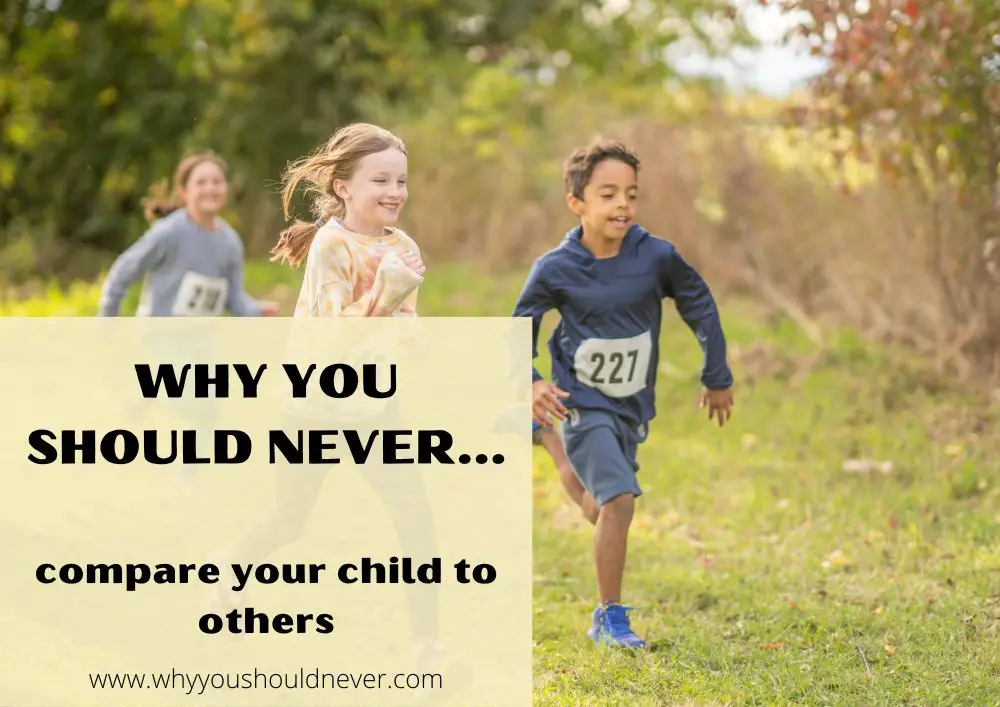![]()
Why You Should Never Compare Your Child To Others
So, you’ve stumbled onto the world’s greatest parenting paradox – the seemingly insatiable urge to compare your kid to others, even though it feels all kinds of wrong.
Like you’re at a park, and you see this kid, half your child’s age, doing a perfect triple axel on the skateboard. Suddenly, you find yourself glancing at your own kid, who’s currently trying to eat a handful of sand! Not great for the ego, is it? And you might even start wondering if there’s something ‘wrong’ with your little bundle of joy.
Well, here’s the thing. You absolutely should not compare your kid to others. Not even a little bit. And I’m not just pulling this advice out of thin air. It’s grounded in science and, you know, common sense. Let’s dive into the why of it, shall we?
10 reasons why you shouldn’t compare your child to other children
1. Every child is unique
Okay, this might sound like a cliché you’d find in a fortune cookie, but it’s true. Every kid marches to the beat of their own drum. Some kids are born bookworms while others are miniature daredevils. Some can sing before they can talk, while others have two left feet but can build amazing sandcastles.
So, when you compare your child to another, it’s like comparing apples to oranges, or kittens to koalas. Not particularly useful, is it?
2. Undermines self-confidence
Confidence is a tricky beast. It takes years to build, but can be knocked down in an instant. Now imagine being a kid and constantly hearing, “Why can’t you be more like Timmy?” Crushing, right?
Even if you’re not saying it out loud, kids are like sponges, they can sense your disappointment. Over time, this could lead to them doubting their abilities and having a lack of self worth.
3. Sets unrealistic expectations
In the immortal words of Uncle Ben from Spiderman, “With great power comes great responsibility.” As a parent, your expectations carry weight. If they’re not based on your child’s abilities, interests, and pace, it could lead to stress, anxiety, even resentment.
4. Affects your relationship
Constant comparison can put a strain on your relationship with your child. It might make them feel like they’re not good enough for you or that they’re living in the shadow of someone else. Over time, this could lead to them pulling away from you.
5. Neglects individual growth and potential
When you’re busy wishing your child was more like someone else, you might miss seeing the awesome person they’re becoming. Each child has their unique gifts and talents. By embracing them for who they are, you encourage them to grow in their own unique way and to reach their full potential.
6. It’s not always a fair comparison
More often than not, we’re comparing our kids’ weaknesses to others’ strengths. It’s easy to focus on the areas where your child seems to be lagging, but remember, every child has their own strengths and weaknesses.
Maybe your kid isn’t as athletic as the next-door neighbor, but can they solve a Rubik’s cube in under a minute? You might not be seeing the whole picture when you make comparisons.
7. Encourages a competitive mindset
While a healthy dose of competition isn’t bad, making your child constantly feel like they have to ‘win’ against others can be harmful. It can make them view relationships in terms of ‘competition’, which might affect their social skills and friendships.
8. It can create a fear of failure
If a child constantly feels they have to live up to the achievements of others, they might develop a fear of failure. This can deter them from trying new things or taking on challenges, which is vital for their growth and learning.
9. Fosters rivalry and jealousy among children
When comparisons become part and parcel of your parenting style, it’s not just your child who suffers. This can also foster rivalry and jealousy among siblings or friends.
Think about it – if you’re constantly measuring your child against their brother, sister, or best friend, they may start to see them as competitors rather than confidantes. That’s not a healthy dynamic, and it can sow the seeds of resentment and jealousy.
10. Parenting will become joyless
If you’ve fallen into the comparison trap, you may find that the joy of parenting starts to fade away. It’s kind of like turning your parenting journey into a competitive sport, where you’re always anxious about scores and stats.
Rather than reveling in your child’s laughter, cherishing their first doodles, or simply enjoying a quiet cuddle, you’re perpetually fretting over how they measure up against others. This can rob you of the joy and beauty that lies in raising a child.
Final word
Comparing your child to others can create a toxic cocktail of emotions – from crushing their self-confidence, setting unrealistic expectations, creating rivalry and jealousy among kids, to sucking the joy right out of parenting. It’s a no-win situation, really.
Instead, let’s celebrate our children’s individuality, let’s nourish their unique strengths and help them navigate their weaknesses. Let’s offer them a secure environment where they can grow at their own pace, free from the shadows of others’ achievements.
Remember, it’s not about having your kid be ‘the best’ compared to others, but about them being ‘their best’ self.
